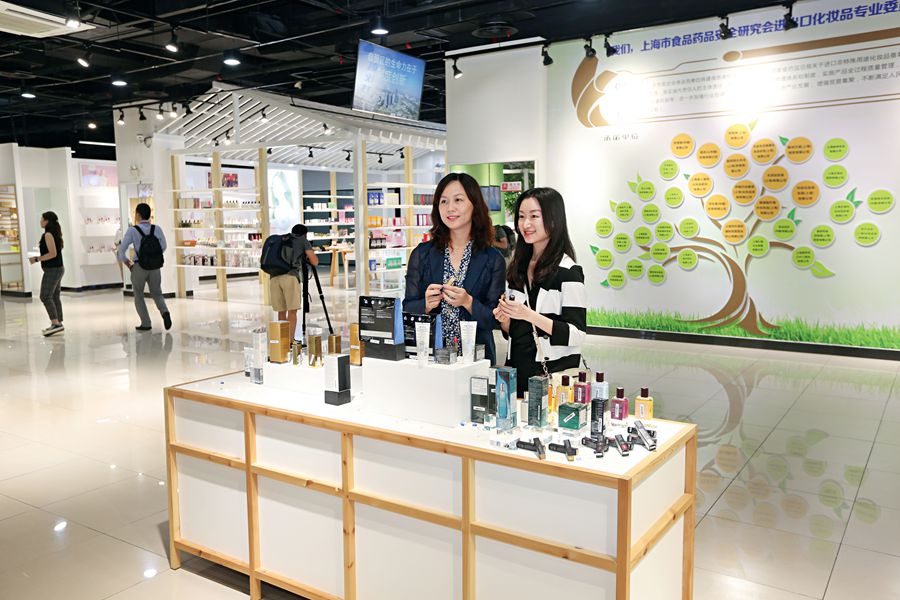NEW policies for imported cosmetics can help Chinese enterprises introduce the latest products to the Chinese market more rapidly, which will, in turn, have positive spin-off effects, said Tu Chunyi, representative of the L’Oréal Group in China.
Tu cited the example of the Advanced Genifique Yeux Youth Activating Eye Cream by Lancome, which was approved to enter the local market by the Registration of Imported Cosmetics for Non-Special (non-medical) Purposes (the Registration in short) during the June 18 Promotion in China, leading to the product’s sales hitting record highs. The new policies of the Registration do not just contribute to bringing Chinese overseas consumption home, but also stimulate domestic demand, according to Tu.

Customers spoilt for choice of foreign brands in Waigaoqiao International Cosmetics Exhibition & Trading Center.
The pilot reform of the Registration of Imported Cosmetics for Non-Special Purposes was first initiated in Pudong New Area in Shanghai. Since it came into effect on March 1, 2017, the reform has greatly shortened the time required for importing cosmetics to China. L’Oréal Group is one of the many enterprises that benefit from the reform.
On Shelves Earlier
“Many people don’t know that it took usually five to six months for a famous international cosmetics brand to be approved and sold in China. The time required for getting the approval alone was as long as three months. However, since the initiation of the pilot reform, it now takes just five days to get cosmetics approved,” said Shen Jianhua, deputy director of Market Supervision Administration at Pudong of Shanghai.
The new policies mean that foreign cosmetic products can now be on retail shelves in China at the same time as other fashion capitals of the world.
“Chinese consumers will no longer have to go to Korea, Japan, or hire an overseas shopper to get their favorite cosmetics,” said Tu.
From March 1, 2017, to December 21, 2018, simple customs clearance is applied on all imported cosmetics for non-special purposes through Shanghai Pudong New Area Port, if the importer is registered in Shanghai Pudong New Area. The previous approval management has been adjusted to registration management. Customs information is registered on the system and a voucher is issued to the importer, which can be printed and presented to customs to facilitate clearance procedures.
Shen said that since the reform began over a year ago, a total of 2,016 cosmetics for non-special purposes have completed the registration review process. The reform is welcomed by more and more international cosmetics enterprises. “Enterprises can get more benefits when the procedure is streamlined and faster, and what consumers can get is the pleasure of trying the new product as early as possible, said Shen, who described the reform as the “Pudong Speed” of importing cosmetics.
Increase in Registrations
Shanghai is one of the cities in China where the R&D, production, operation, and consumption of cosmetic brands are most concentrated, and its trade volume of imported cosmetics accounts for 58 percent of the country’s trade volume. The declarations of imported cosmetics for non-special purposes take up more than 50 percent of the country’s total.
Shen refers to the reform as “the continuations and the innovations.” The continuations mean that the documentation requirements, technical requirements, and content of document review remain the same, while the innovations refer to the changes in the review measures where approval of the document review is replaced with the inspection and review of the document, which must be done in less than three months after registration. At the same time, to ensure the quality of product review, five experts and the Shanghai Municipal Bureau are now required to do online reviews of the products, as opposed to the single expert review in the past. In the pilot reform of the Registration of Imported Cosmetics for Non-special Purposes, Measures for Supervision on the Registration Classification, Measures for Supervision on the Registration Risks, and Measures for Managing the Document of the Registration Integrity have been drafted to enhance the detection of negative effects of the cosmetics. In the past, once the product was granted import approval, it was no longer monitored. Now, it is monitored to ensure consumers use safe cosmetics.
While initially enterprises held a wait-and-see attitude about the reform, the number of user name registrations, product registrations, and the import volume of cosmetics have all seen rapid increase.
Shen told China Today that 45 cosmetics enterprises registered and settled in Pudong New Area and seven enterprises have enlarged their scope of business. L’Oreal, Chanel, and other multinational cosmetic companies that have already registered in Pudong also joined the pilot reform when it was first launched. For example, Chanel has successfully registered over 100 products, and most of them have already come out on the market. Brands like Estée Lauder and Procter & Gamble have also been attracted to the Pudong New Area and are preparing related business there.
As of the end of June, 2018, 264 user names have been registered, including products of 237 overseas enterprises from 32 countries and regions. The number of products that have already been issued with registration vouchers is 1,680.
China’s State Council has decided to replicate the success of Pudong New Area in 10 free trade zones around the country, including Tianjin, Liao-ning Province, Zhejiang Province, Fujian Province, Henan Province, Hubei Province, Guangdong Province, Chongqing Municipality, Sichuan Province, and Shaanxi Province. It is also determined to promote the registration management of imported cosmetics for non-special purposes.
